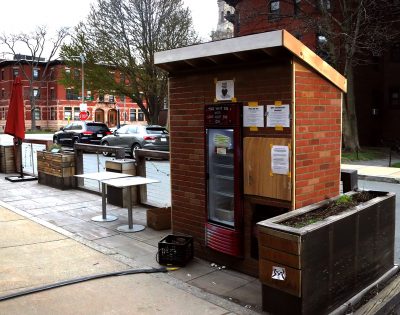At 1471 Dorchester Ave., 672 Centre St. in Jamaica Plain and 420 Watertown St. in Newton stand three fridges, all stocked with healthy, free food. Anyone is welcome to donate what they can and take what they need.

More than a dozen community fridges have popped up in the Boston-area since September of last year, as part of a grassroots movement to address food insecurity and waste in local communities, Josiel Gonzalez, a community organizer helping the Jamaica Plain’s community fridge, said.
“We need to start opening our hearts more instead of thinking about it from a wallet standpoint,” he said. “That’s where we can start to see the shift, when we put humanity first and not capitalism.”
Gonzalez was inspired to bring a community fridge to Boston last summer, he said, after reading an article on a similar community fridge in New York City. Joined by a group of like-minded volunteers organized on a Slack channel, they brought their community a fridge.
At first, he said the goal was to keep the fridge stocked with nutritious foods — motivated by the prevalent problem of food waste and food insecurity, which had only been exacerbated by the pandemic.
“Especially considering that it’s a pandemic,” he said, “we want to make sure we [are] keeping our immune systems up. Giving people access to foods that are anti-inflammatory in nature was pretty important for us.”
Around 9% of people in Massachusetts were food insecure prior to the pandemic. That number is projected to have increased to around 14% — one in seven people — according to statistics by the Greater Boston Food Bank.
But, approximately 30% to 40% of food is wasted in the United States, according to the U.S. Department of Agriculture.
“There’s always going to be a marginalized group the way our system is set up right now,” Gonzalez said, “because it’s very clear that [food] is not trickling down in a fair way.”
When Pigs Fly Bakery in Brookline partnered with the team to donate 80 loaves that would have otherwise gone to waste, he said.
He added the people began to donate food on their own accord, and later donated menstrual products and cleaning supplies.
“We realized very early on that the fridge was going to be more self-sustainable than we thought,” Gonzalez said, “because it runs on the kindness in the hearts of everybody around it.”
Others quickly began to set up a fridge in their own community, Gonzalez added, and the network of fridges spread to different neighborhoods.
The Newton community fridge has been in use since March 14, volunteer coordinator Sindy Wayne said. It has since seen a “tremendous use” by an “uncountable” number of community members.
“Clearly, the need for supplemental food and other resources is out there,” she said.
Volunteers clean the fridge several times a day, monitor for prohibited items, organize and stock the fridge, she added, but the fridge itself remains largely unmonitored.
The Newton fridge’s location holds a pivotal role, Wayne said. Proximity to food pantries and the fridge’s hosts have contributed to its “overwhelming success.”
“Our hosts have been so generous,” she said. “People can pull into the parking lot for a quick visit and get what they need and then go on their way.”
A fridge’s host owns the land where it’s placed, Gonzalez said. Sometimes, the host will cover the estimated $30-per-month electricity bill to keep the fridge up and running.
Such was the case with the first Jamaica Plain fridge, he added, when the owner of the D’Friends Barber Shop in the neighborhood offered to cover the cost of the space.
Gonzalez said as society has become more “individualistic,” many people who could benefit from the fridge might have too much pride to do so. However, other volunteers believe their anonymity is what separates themselves from other food resources.
“The point of the fridge is to be a resource, a free resource, for people to use where they don’t have to divulge any personal information, they don’t have to show an ID, to get the food,” Dorchester community fridge volunteer Michael Zayas said.
Zayas said the Dorchester fridge generally runs itself, although a selection of Boston University Community Service Center volunteers have assisted the past several Saturdays.
He said the lack of food resource awareness worsens food insecurity. Because of this, part of the volunteers’ work is informing the public.
The fridge — which has been up since September — is “only a small cog” in addressing “the broader scope” of food insecurity, Zayas said.
“I don’t know if we’ll ever be able to get rid of the food insecurity problem completely,” he said, “but at least help out as much as we can.”
Colbi Edmonds contributed to the reporting of this article.





















































































































